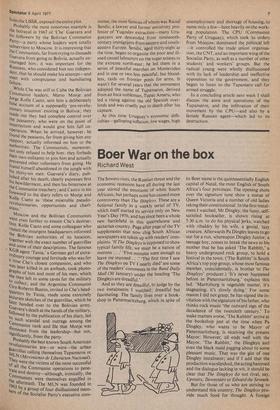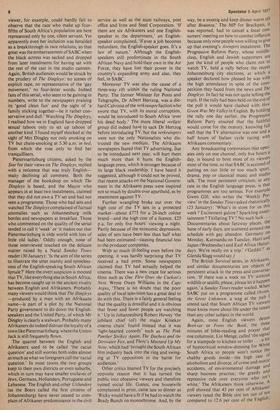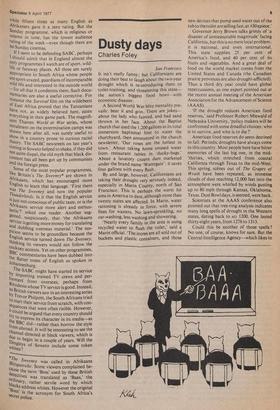Boer War on the box
Richard West
The Soweto riots, the Russian threat and the economic recession have all during the last year stirred the emotions of white South Africans, but perhaps none has caused more controversy than The Dingleys. These are a fictional family in a weekly serial of TV, which itself started its service only on New Year's Day 1976, and has since been a whole new battlefield in this quarrelsome and sectarian country. Page after page of the TV supplements that now clog South African newspapers are taken up with readers' complaints. `If The Dingleys is supposed to show typical family life, we must be a nation of morons . . ."Five minutes were enough to leave me stunned . ."The first time I saw The Dingleys on TV I nearly died' are some of the readers' comments in the Rand Daily Mail (30 January) under the heading 'The Dingleys are dreadful.'
And so they are dreadful, to judge by the two instalments I watched; dreadful but fascinating. The family lives over a bookshop in Pietermaritzburg, which in spite of
its Boer name is the quintessentially English capital of Natal, the most English of South Africa's four provinces. The opening shots over the signature tune show a statue of Queen Victoria and a number of old ladies taking their constitutional. In the first instalment I watched, Mr Dingley, the fussy, selfsatisfied bookseller, is shown rising at 5.30 a.m. to do his physical jerks, watched with ribaldry by his wife, a genial, lazy creature. Afterwards Pa Dingley leaves to go out for a run, whereupon Dingley Junior, a teenage boy, comes to break the news to his mother that he has asked 'The Rabbitt,' a heavy underground rock group, to hold a festival in the town. ("The Rabbitt' is South Africa's top pop group, whose most famous member, coincidentally, is brother to The Dingleys' producer.) 'It's never happened before in Pietermaritzburg,' explains this lad. 'Maritzburg is vegetable matter, it's stagnating, it's slowly dying.' For some reason I did not grasp, he has signed the invitation with the signature of his father, who thinks rock music 'the outward sign of the decadence of the twentieth century.' To make matters worse, 'The Rabbitt' arrive at the bookshop just at the time when Pa Dingley, who wants to be Mayor of Pietermaritzburg, is receiving the present Mayor. However, all ends well with the Mayor, 'The Rabbitt,' the Dingleys and even the black maid jogging about to some pleasant music. That was the gist of one Dingley instalment; and if I add that the production was slipshod, the acting hammed and the dialogue lacking in wit, it should be clear that The Dingleys do not rival, say, Upstairs, Downstairs or Edward the Seventh.
But for those of us who are striving to understand this country; The Dingleys provide much food for thought. A foreign
viewer, for example, could hardly fail to observe that the race who make up fourfifths of South Africa's population are here represented only by one, silent servant. Yet apparently even her inclusion was heralded as a breakthrough in race relations, so that great was the embarrassment of SABC when the black actress was sacked and dropped from later instalments for having sat with the rest of the cast in the studio canteen, Again, British audiences would be struck by the prudery of The Dingleys: no scenes of explicit rape, no representative of the 'gay movement,' no four-letter words. Indeed fans of this serial, who seem to be gaining in numbers, write to the newspapers praising its 'good clean fun' and the sight of 'a family sticking together—be it rather conservative and dull.' Watching The Dingleys, I realised how we in England have dropped sexual taboos only to set up taboos of another kind. I found myself shocked at the sight of Mrs Dingley not only smoking on TV but chain-smoking at 5.30 a.m. in bed, from which she rose only to find her tranquillisers.
Pietermaritzburg citizens, asked by the Star for their views on The Dingleys, replied with a reticence that was truly English— many declining all comment. Both the manager of the bookshop on which The Dingleys is based, and the Mayor who appears in at least two instalments, claimed that they did not own a TV set and had not seen a programme. Those who had sets and watched The Dingleys complained of factual anomalies such as Johannesburg milk bottles and newspapers at breakfast. Those who commented on the quality of the serial tended to call it 'weak' or 'it makes out that Pietermaritzburg is olde world with lots of little old ladies.' Oddly enough, none of those interviewed touched on the delicate matter raised by a Natal Sunday Times reader (30 January): 'Is the aim of the series to illustrate the utter inanity and spinelessness of the English-speaking South African female?' Here the overt suspicion is mooted that TV, like everything else in South Africa, has become caught up in the ancient rivalry between English and Afrikaners. Probably many viewers would think that The Dingleys —produced by a man with an Afrikaans name—is part of a plot by the National Party government to do down the Englishspeakers and the United Party, of which Mr Dingley is clearly a stalwart. Probably many Afrikaners do indeed distrust the loyalty of a town like Pietermaritzburg, where the Union Jack is still frequently flown.
The quarrel between the English and Afrikaners used to be called 'the racial question' and still worries both sides almost as much as what we foreigners call the 'racial question.' In most towns the two groups keep to their own districts or even suburbs, which in turn may have smaller enclaves of Jews, Germans, Hollanders, Portuguese and Lebanese. The English and other Uidanders (as the Boers called the first citizens of Johannesburg) have never ceased to complain of Afrikaner predominance in the civil service as well as the state railways, post office and Iron and Steel Corporation. 'If there are six Afrikaners and one Englishspeaker in the department,' an Englishspeaker complained, `if ever a job becomes redundant, the English-speaker goes. It's a law of nature.' Although the Englishspeakers still predominate in the South African Navy and hold their own in the Air Force, they have lost their power in the country's expanding army and also, they feel, in SABC.
Moreover TV was also the cause of a three-way rift within the ruling National Party. The former Minister for Posts and Telegraphs, Dr Albert Hertzog, was a diehard Calvinist of the verkrampte faction who swore that TV, with its moral corruption, would be introduced to South Africa 'over his dead body.' The more liberal verligte group did indeed have to sack Dr Hertzog before introducing TV, but the verkramptes were not the only Nationalists who distrusted the new medium. The Afrikaans newspapers feared that TV advertising, due to be introduced next year, will hurt them much more than it hurts the Englishlanguage press, which is stronger because of its large black readership. I have heard it suggested, although it could not be proved, that recent attacks on the National Government in the Afrikaans press were inspired not so much by doubts over apartheid, as by resentment against TV.
Further wrangling broke out over the high cost of the TV sets in a protected market—about £775 for a 26-inch colour brand—and the high cost of a licence, £25 p.a. for only five hours' viewing a night. Partly because of the economic depression, sales of sets have been less than half what had been estimated—causing financial loss to the producer companies.
With so much ill-feeling even before the opening, it was hardly surprising that TV received a bad press. Some newspapers claimed that TV had actually helped the cinema. There was a new craze for serious films such as One Flew Over the Cuckoo's Nest. Wrote Owen Williams in the Cape Argus, 'There is no doubt that the poor quality of local television has a. great deal to do with this. There is a fairly general feeling that the quality is dreadful and it is obvious that fewer and fewer people are watching it.' Up in Johannesburg Robert Howey 'the jubilant chief (of) the major Kinekor cinema chain' found instead that it was 'light-hearted comedy' such as The Pink Panther Strikes Again, The Duchess and the Dirt water Fox, and There's Mustard Up My Nose, which had 'brought the South African film industry back into the ring and swinging at TV opposition in the battle for audiences.'
Other critics blamed TV for the precisely opposite reason that it has turned the public into obsessive viewers and therefore ruined social life. Guests, one housewife complained in print, came late to dinner as 'Ricky would have a fit if he had to watch the Brady Bunch on monochrome. And, by the
way, be a sweetie and keep dinner warm till after Bonanza.' The MP for Brackpan, it was reported, had to cancel a local consumers' meeting on how to combat inflation because only nine people were willing to give up that evening's Avengers instalment. The Progressive Reform Party, whose middleclass, English and Jewish supporters are just the kind of' people who claim not to watch TV, held a rally before the recent Johannesburg city elections, at which a speaker declared how pleased he was with the high attendance in spite of the competition they faced from the news and The Dingleys. In fact he was not quite telling the truth. If the rally had been held on the eve of the poll it would have clashed with Holv Green Was My Valley in English. By holding the rally one day earlier, the Progressive Reform Party ensured that the faithful would come for the oratory. knowing full well that the TV alternative was one and a half hours of Italian cycle racing with Afrikaans commentary.
Any broadcasting corporation th'at operates only on one channel, only five hours a day, is bound to bore most of its viewers most of the time, so that SA BC is accused of putting on too little or too much snort, drama, pop or classical music and studio talk. The most persistent criticism, at anY rate in the English language press, is that programmes arc too serious. For exarnnie Gwen Gill, who writes the 'Weekly Preview' in the Sunday Times asked rhetorically (23 January): 'What's in store for us this week ? Excitement galore ? Sparkling entertainment? Titillating TV? No such luck . • • Documentaries about faraway places, the bane of early days, are scattered around the schedule with gay abandon. Germany on Monday, Katmandu on Tuesday, Haiti and Japan (Wednesday) and East Africa (Saturday). We're really on a trip.' ('Geddit? as Glenda Slagg would say.) The British Survival series, in Afrikaans. and similar documentaries are objects of persistent attack in the press and conversation. 'If there was a week on TV without wildlife or seari fe, please, please let it hanger) again,' a Sunday Times reader wailed. When SABC put on a programme called Ocean, the Great Unknown, a wag at the pub I attend said that South African TV viewers must know more about life under the ocean than any other subject in the world. Again, most English viewers detest Boekvat or From the Book, the three minutes of bible-reading and prayer that one columnist. Lin Menge, called 'the signal for a stampede to kitchen or toilet . a bit of hypocritical window-dressing for While South Africa so people won't notice the shabby goods inside—the high rate of alcoholism and divorce, of crime and motor accidents, of environmental damage and, sharp business practice; the greedy ana repressive rule over everyone who isn't white.' The Afrikaners think otherwise. A poll showed that 43 per cent of Afrikaner viewers rated the Bible slot ten out of ten compared to 12.6 per cent of the English:
While fifteen times as many English as Afrikaners gave it a zero rating. But the Sunday programme, which is religious or solemn in tone, has the lowest audience rating of the week—even though there are no Sunday cinemas.
If I seem to be defending SABC, perhaps I should admit that in England almost the only programmes I watch are of sport, wildlife or faraway places. All three are surely aPpropriate to South Africa whose people are sport-crazed, guardians of incomparable wild life and interested in the outside world — for all that it condemns them. Such documentaries are also a useful Corrective. For instance the Survival film on the wildebeest of East Africa proved that the Tanzanians have not, as widely believed here, eaten everything in their game park. The magnificent Thames World at War series, whose instalment on the extermination camps was shown here after all, was surely useful to Show in a country prone to curious racial theory. The SABC newsreels on last year's rioting in Soweto helped to shake, if they did not quite dispel, the old myth that black discontent has all been got up by communists and the foreign press. Some of the most popular programmes, like Britain's The Sweeney* are shown in Afrikaans, which has encouraged more English to learn that language. 'First there was The Sweeney and now the popular Thunderbirds. Is it that the English service is just not conscious of public taste, or is the Afrikaans service more alert and enthusiastic? asked one reader. Another suggested, suspiciously, that 'the Afrikaans service is getting more money for translating and dubbing overseas material.' The susDicion seems to be groundless because the English service turned down The Sweeney, thinking its viewers would not follow the Tekney accents. Yet on other programmes, .t.IBC commentaries have been dubbed into The flatter tones of English as spoken in Johannesburg. The SABC might have started its service °31 importing trained TV crews and performers from overseas, perhaps from Rhodesia whose TV service is good. Instead. by British viewers saw in an interesting series b Trevor Philpott, the South Africans tried to start their service from scratch, with cons.equences that were often risible. However, n could be argued that every country should try to express its character in its media—as e BBC did—rather than borrow the style from abroad. It will be interesting to see the Channel directed at black viewers, which is ur,t-ie to begin in a couple of years. Will the "ingleys of Soweto include some token whites?
*The Sweeney was called in Afrikaans 81ttspatrolie. Some viewers complained because the term 'Boss' used by these British detectives was translated as 'Baas,' the ordinary, rather servile word by which blacks address whites. However the original Boss' is the acronym for South Africa's secret police.


































 Previous page
Previous page